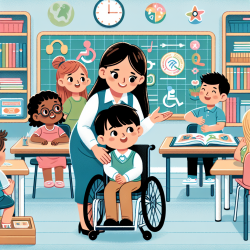Introduction
In the ever-evolving field of speech-language pathology, practitioners are constantly seeking innovative ways to enhance their skills and create better outcomes for their clients. One such avenue is through the implementation of data-driven tools that assess and foster community resilience. The recent study titled "Psychometric properties of the Korean adaptation of the communities advancing resilience toolkit (CART) assessment survey" offers valuable insights into how practitioners can leverage these tools to improve their practice.
Understanding the Korean CART Assessment
The Communities Advancing Resilience Toolkit (CART) is a comprehensive assessment tool designed to measure community resilience. The Korean adaptation of this toolkit, known as K-CART, was evaluated for its psychometric properties in a study involving 315 older adults in Pohang city, South Korea. The research aimed to establish the cross-cultural adaptation of the CART assessment survey and evaluated its test-retest reliability, internal consistency, content validity, and construct validity.
Key Findings
The study revealed that the K-CART demonstrated strong psychometric properties, making it a reliable tool for assessing community resilience in Korean communities. Key findings include:
- Test-Retest Reliability: The intraclass consistency coefficient was .90, indicating high reliability over time.
- Internal Consistency: The Cronbach's alpha was 0.91, demonstrating satisfactory internal consistency.
- Content Validity: The content validity index (CVI) was high, with both item-CVI and scale-CVI at 0.95.
- Construct Validity: Confirmatory factor analysis showed that the expanded K-CART with five factors achieved an acceptable model fit.
Implications for Practitioners
For speech-language pathologists and other practitioners, these findings underscore the importance of utilizing validated tools like the K-CART to assess and enhance community resilience. By integrating such tools into their practice, practitioners can:
- Identify areas of strength and vulnerability within communities.
- Develop targeted interventions to bolster resilience.
- Monitor progress and adapt strategies based on data-driven insights.
Encouraging Further Research
While the K-CART offers a robust framework for assessing community resilience, further research is encouraged to explore its application in diverse settings and populations. Practitioners are urged to contribute to this growing body of knowledge by conducting studies that evaluate the tool's effectiveness in different contexts.
Conclusion
Incorporating the K-CART into practice not only enhances the ability to assess community resilience but also empowers practitioners to make informed, data-driven decisions that lead to improved outcomes. By embracing such tools, we can collectively work towards building stronger, more resilient communities.
To read the original research paper, please follow this link: Psychometric properties of the Korean adaptation of the communities advancing resilience toolkit (CART) assessment survey.










